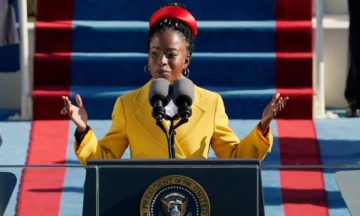Kit Fan in The Guardian:
 What happens when words spoken on Capitol Hill make us shiver? Amanda Gorman’s luminous poem The Hill We Climb was addressed to Joe Biden and “the world”. Inaugural poems are a fiendishly difficult genre, attempted only six times since JF Kennedy’s ceremony. However, such “occasional” poems play an important cultural role, especially in our time when no public rhetoric and few common values can be taken for granted, as the poet addresses and repairs the damaged foundations of the state itself.
What happens when words spoken on Capitol Hill make us shiver? Amanda Gorman’s luminous poem The Hill We Climb was addressed to Joe Biden and “the world”. Inaugural poems are a fiendishly difficult genre, attempted only six times since JF Kennedy’s ceremony. However, such “occasional” poems play an important cultural role, especially in our time when no public rhetoric and few common values can be taken for granted, as the poet addresses and repairs the damaged foundations of the state itself.
A soaring sense of history and solidarity pervades Gorman’s debut collection. Part elegy, part documentary record, and part witness statement, Call Us What We Carry is first and foremost “a letter to the world”, a phrase she borrows from Emily Dickinson. Like Dickinson’s, Gorman’s poetry puts immense pressure on our present moment, committing itself to an archaeology of our past and conservation of our future. It urges us to revisit the chequered history of intersectional injustices and re-evaluate our fragile species, systems and planet, engulfed by the pandemic, personal grief and public grievances.
“What happened to us”, Gorman writes, “Happened through us.” One of the most haunting things about her book is its retreat from the first-person singular. “I” exists sparingly, peripherally. By contrast, the all-inclusive trio “we”, “us” and “our” occur more than 1,500 times in her shape-shifting poems, a rare feat in the age of overwhelming selfhood. Gorman’s affirmative choric we echoes Martin Luther King’s memorial dream and John Lennon’s utopian lyricism, but her music also draws on the new dimension opened up by trailblazing poets such as Elizabeth Alexander, Anne Carson and Tracy K Smith. She challenges Walt Whitman’s “I am large. I contain multitudes.” In her book, it is we who contain multitudes, and a shared vision, grief and responsibility, as she affirms that “This book is awake. / This book is a wake. / For what is a record but a reckoning?”
More here.
